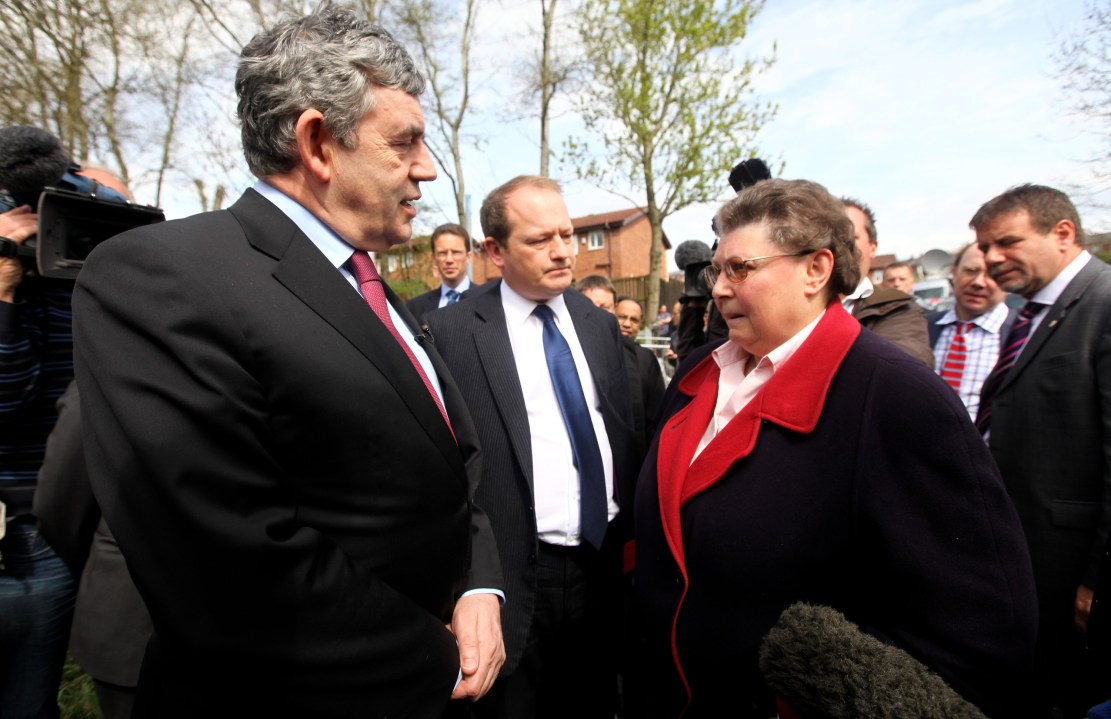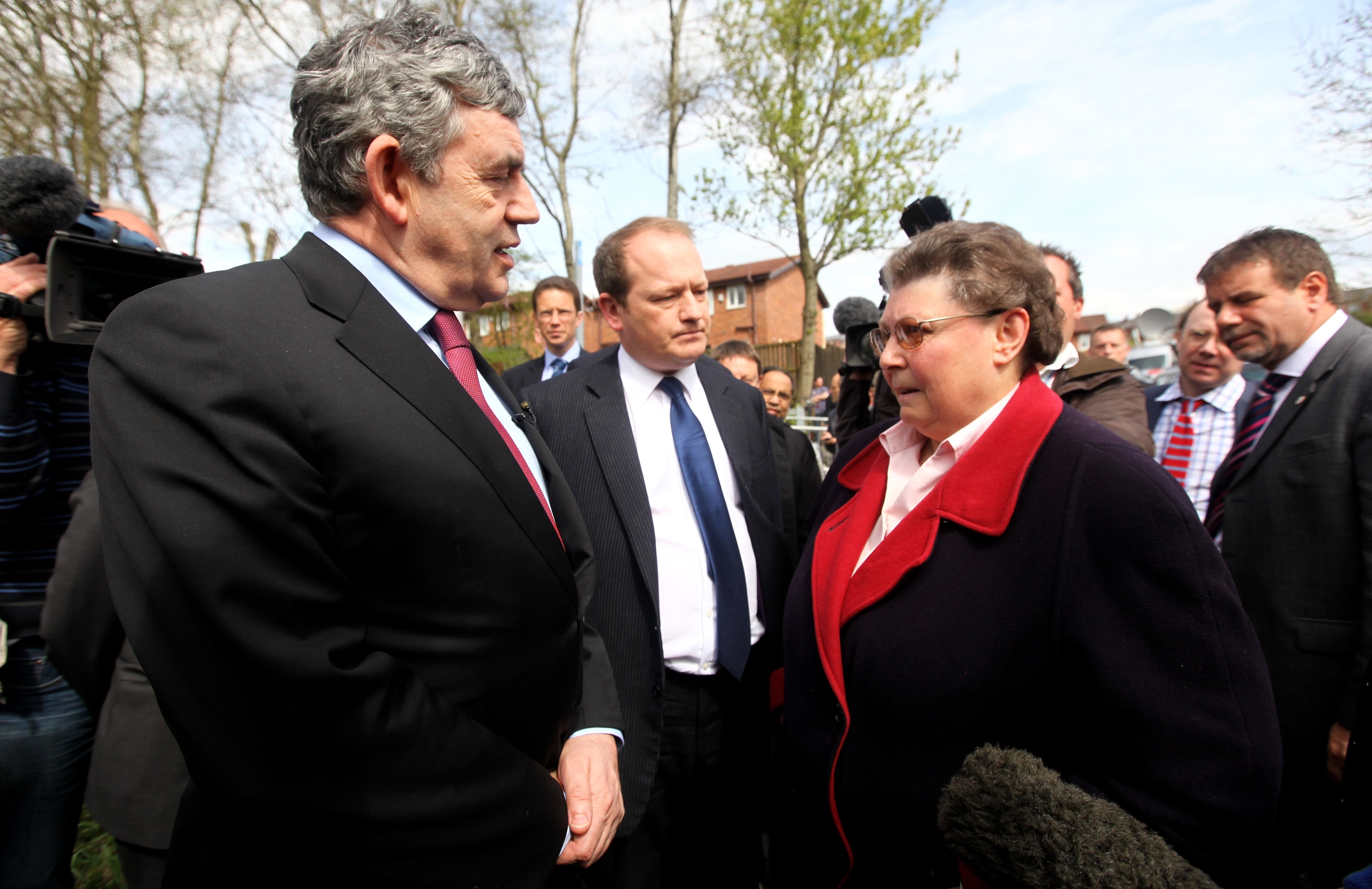As Gordon Brown’s new memoir, My Life, Our Times, sends mild ripples across the political play pool, the rest of the country tends to its own business. But there’s an episode from Brown’s turbulent spell as Prime Minister that merits revisiting: ‘Bigotgate’. Not only was it the moment that perhaps secured Labour’s dramatic fall from power but Brown’s finessing of what happened has worrying signs for politicians’ private frankness.
You remember it well: while pressing the flesh in Rochdale as part of the 2010 election campaign, Brown found himself in conversation with a lifelong Labour voter. For a savvy politician, this was a golden opportunity to play the crowd and reiterate the party’s core beliefs. Gillian Duffy, a 66-year-old pensioner, had other ideas, instead cataloguing a long litany of gripes, including the dread issue of immigration. Brown struggled to keep his head above the water as the cameras devoured the clumsy exchange. He ran for the cover of his car and proceeded to rollock his incompetent advisers. But Sky News – and the country – were still enjoying his microphone’s audio feed. ‘That was a disaster,’ he growled. His team ‘should never have put me with that woman. Whose idea was that?’. What did she say? ‘Oh, everything…she’s just this sort of bigoted woman that said she used to be Labour. I mean, it’s just ridiculous.’
When the recording was later sprung upon Brown, his head fell to his hands to create what proved to be the defining image of his campaign. Flummoxed, he went into turbo-contrition:
‘I apologise if I have said anything like that… I’m blaming myself. I blame myself for what is done.’
Given the context, he could hardly say anything else. Brown was ‘mortified’, he said. But Duffy was just bemused:
‘He’s an educated person. Why has he come out with words like that?’
Why indeed. Brown’s autobiography could have unpicked his thought process during this watershed moment. Instead, he recasts Duffy as a single-issue irritant who failed to echo his targeted messages for Rochdale: she ‘wanted to talk about something else – immigration.’ Revisit the footage, though, and you’ll see that this formed an eight-second element in a wide-ranging, five-minute conversation:
Still, Brown repeats that he ‘made the mistake of describing Duffy as a ‘sort of bigoted woman’. Yet Brown evidently did take Duffy as a bigot: that was his immediate reaction to a relatively calm and straightforward conversation. And if he thought Duffy’s views were bigoted, he should have tackled them openly and defeated these demons in debate. Naturally, in an election campaign, this could have proved explosive, so he shirked defusing a sensitive subject. But his long-meditated memoirs offered him the chance to analyse his reaction for what it was. Instead, he dodges the bullet. Not only does he unfairly present Duffy as a crank but he paints the depressing picture of himself as a man whose off-the-cuff remarks in private were opposed to what he wanted to tell the people. That is an abject state of affairs: if he couldn’t even moan accurately, he was scarcely worthy of the post.
But enough of Brown; let’s focus on frank speech in private, especially among our ever-drabber careerist politicians. We should be worried if our public representatives don’t pour forth their frustrations privately. If when away from the camera they cannot express forthright disagreement, and sometimes turn to colourful language, we are in a pretty pickle. Direct talk focuses the mind and greases the wheel of debate. We need to allow politicians space for blunt speech without it reappearing as a stick to beat those who have used it in earnest. But this is becoming increasingly difficult. Emails enter the digital ether for an eternity, one step away from a Freedom of Information request; phone-calls are losing out to the clipped and disconnected exchanges of WhatsApp or social media. The art of the no-holds-barred berserker rant is on the wane.
I want a Prime Minister who can express their frustrations forcefully, albeit to a closed audience. If an interview, or even a negotiation, fares terribly, I want to know that there is a flurry of fury behind the scenes. If politicians really have become as anaemic in private as they are in public – and the likes of Malcolm Tucker are just the creation of satire – then the end of effective government is very much nigh. Ken Clarke, for instance, was right not to recant about describing Theresa May as a ‘bloody difficult woman’; but at the twilight of his career he had little to lose. Let’s hope that all our politicians still feel they have the leeway to vent their indignation. Yes, there’s the genuine danger of being caught out. So be it. Far worse is the danger of not voicing concerns and criticisms when the leadership of the country is at stake. Gordon Brown was wrong to tar Gillian Duffy as a bigot, but right – you have to say, even if he cannot – to rail wildly in private about things going well and truly awry.







Comments